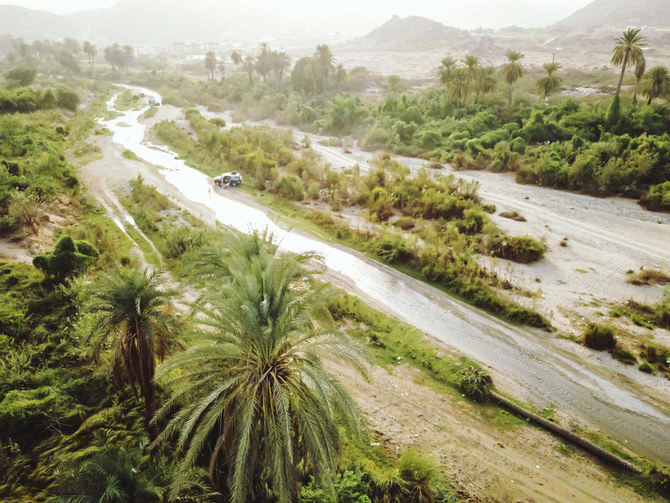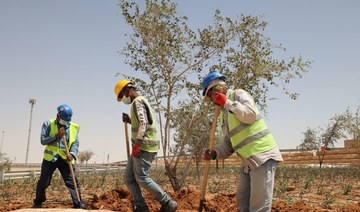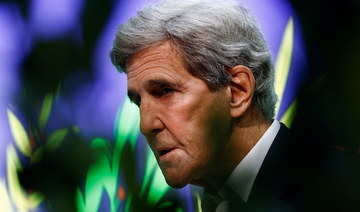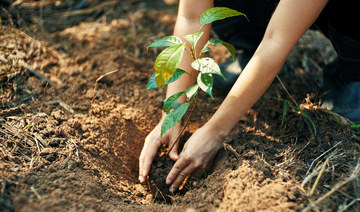RIYADH: The forthcoming Saudi Green Initiative (SGI) Forum, to be held in Riyadh on 23-24 October, is set to be a milestone in the historic effort to transform the oil-based economy of Saudi Arabia into a cleaner and more sustainable one.
In addition to planting 10 billion trees (covering 30 percent of total land area), the SGI aims to create vast protected zones, conserve marine life around the coasts and encourage alternative forms of agriculture. One key aspect of this sea change will be the contribution of technology to the greening of Saudi Arabia.
A leader in the realm of agritech is Dr. Nahid Sidki, chief technology officer with Research Products Development Company (RPDC), a PIF-owned not-for-profit resource for the commercialization of Saudi-based research and breakthrough technology.
With a 30-year background in Silicon Valley, where he was executive director at the Stanford Research Institute, Dr. Sidki is an authority on robotics and artificial intelligence (AI).
“The SGI is a great initiative that can produce a clean future, reduce carbon emissions and impact climate change,” Dr. Sidki told Arab News. “AI and robotics can play a major role in this, not only here in Saudi Arabia but across the Gulf region.”
But how exactly does hi-tech have anything to do with planting trees and growing crops? The answer lies partly in the sheer volume of what the SGI envisions.
“To plant 10 billion trees in a country like Saudi Arabia, one has to ask how they will be monitored and how their health will be sustained for decades to come. We cannot rely on just hoping for the best. We need to look to the ultimate goal and then work backwards in terms of the development and implementation of technology. It’s like a closed-loop ecosystem: planting, monitoring, irrigating and harvesting the trees.”
A primary consideration of the SGI is the use (and misuse) of water, a precious resource in the desert kingdom. Conventional irrigation methods often lead to significant wastage.
Smart dust
“AI can play a crucial role here via smart, efficient irrigation systems that utilize sensors and data analytics to monitor climate conditions and soil moisture,” Dr. Sidki said. “If every tree and every plant had sensors to monitor the condition of the soil surrounding the roots, this could determine exactly when it requires water and exactly what amount.”
Such AI-based solutions are already being put into practice, for example in the form of “smart dust,” nanoparticles that communicate with each other, enabling complex data collection and efficient decision-making in all aspects of agriculture.
“Land health monitoring is also very important,” said Dr. Sidki. “Throughout the life cycle of crops, drones can enable precision spraying and maximize seed pollination, and the same kind of sensor technology can be used for livestock monitoring, crop spraying and smart harvesting.”
These technologies, combined with local and global advances in genetic engineering, could soon turn the parched landscape of Saudi Arabia into an agricultural powerhouse with many verdant oases. Having said that, the greening of Saudi Arabia will require not just the conservation but also the production of potable water.
Some 60 percent of the Kingdom’s fresh water is currently supplied by energy-intensive seawater desalination plants reliant on polluting fossil fuels, an unsustainable solution in view of the SGI. But new desalination and water filtration techniques are emerging quickly, positioning the KSA as a hub for proprietary green technology.
In one RPDC-assisted project called the Red Sea Farm, a group of KAUST researchers have successfully grown tomatoes using a mix of 75 percent seawater and 25 percent freshwater, a scalable method that was recognized and lauded by the United Nations General Assembly in September.
“The idea is to develop smart technology to reduce the cost of desalination,” said Dr. Sidki. “Imagine if we could utilize solar energy for desalination. We would have unlimited fresh water from the ocean, which we are surrounded by in the KSA.”
The SGI represents one aspect of Saudi Arabia’s broader 4th Industrial Revolution (4IR), the fusion of AI, robotics, Internet of Things (IoT), genetic engineering and quantum computing, blurring the boundaries between the physical, digital and biological worlds. This is a highly collaborative movement involving numerous government bodies, PIF-owned companies (both commercial and not-for-profit), academic institutions, corporations, startups and SMEs.
“Robotics and AI will be playing a major role in every sector of society,” said Dr. Sidki. “And here in Saudi Arabia we have huge public and private funds to build capabilities.”
Innovation largely comes down to talent and education, and Dr. Sidki is again optimistic in this regard. “Saudi Arabia has a population of about 35 million, 70 percent of which is 25 or younger. And the percentage of those with a higher degree is very high compared to most other countries. In terms of PhD-holders the KSA probably ranks the highest in the region.”
Saudi Arabia is on the cusp of a major transformation that will involve a great deal of hard work and a lot of imagination.
“There’s an endless list of ways that new forms of technology can improve the quality of our daily life,” Dr. Sidki said. “People need to be very passionate about what they’re doing, and to be aware of the contributions they can make to their society, in order to have a huge impact. I think the combination of education and passion, and that impact, are the ingredients for a society to successfully achieve whatever it wants to do.”
How AI and Robotics will help deliver The Saudi Green Initiative
https://arab.news/yxkdr
How AI and Robotics will help deliver The Saudi Green Initiative

- Saudi Green Initiative (SGI) Forum to be held in Riyadh on 23-24 October
- Saudi Arabia plans to plant 10 billion trees
Open Forum Riyadh to discuss digital currency, AI, and mental health

- The event will run in parallel to the WEF’s Special Meeting on Global Collaboration
LONDON: The Open Forum Riyadh — a series of public sessions taking place in the Saudi capital on Sunday and Monday — will “spotlight global challenges and opportunities,” according to the organizers.
The event, a collaboration between the World Economic Forum and the Saudi Ministry of Economy and Planning, will run in parallel to the WEF’s Special Meeting on Global Collaboration, Growth and Energy for Development, taking place in Riyadh on April 28 and 29.
“Under Saudi Vision 2030, Riyadh has become a global capital for thought leadership, action and solutions, fostering the exchange of knowledge and innovative ideas,” Faisal F. Alibrahim, Saudi minister of economy and planning, said in a press release, adding that this year’s Open Forum being hosted in Riyadh “is a testament to the city’s growing influence and role on the international stage.”
The forum is open to the public and “aims to facilitate dialogue between thought leaders and the broader public on a range of topics, including environmental challenges, mental health, digital currencies, artificial intelligence, the role of the arts in society, modern-day entrepreneurship, and smart cities,” according to a statement.
The agenda includes sessions addressing the impact of digital currencies in the Middle East, the role of culture in public diplomacy, urban development for smart cities, and actions to enhance mental wellbeing worldwide.
The annual Open Forum was established in 2003 with the goal of enabling a broader audience to participate in the activities of the WEF, and has been hosted in several different countries, including Cambodia, India, Jordan and Vietnam.
The panels will feature government officials, artists, civil-society leaders, entrepreneurs, and CEOs of multinationals.
This year’s speakers include Yazeed A. Al-Humied, deputy governor and head of MENA investments at the Saudi Pubic Investment Fund; Princess Reema Bandar Al-Saud, Saudi Arabia’s ambassador to the US; and Princess Beatrice, founder of the Big Change Charitable Trust and a member of the British royal family.
Michele Mischler, head of Swiss public affairs and sustainability at the WEF, said in a press release that the participation of the public in Open Forum sessions “fosters diverse perspectives, enriches global dialogue, and empowers collective solutions for a more inclusive and sustainable future.”
Meituan looks to hire in Saudi Arabia, indicating food delivery expansion

SHANGHAI: Chinese food delivery giant Meituan is seeking to hire staff for at least eight positions based in Riyadh, in a sign it may be looking to Saudi Arabia to further its global expansion ambitions, according to Reuters.
The jobs ads, which is hiring for KeeTa, the brand name Meituan uses for its food delivery operations in Hong Kong, is seeking candidates with expertise in business development, user acquisition, and customer retention, according to posts seen by Reuters on Linkedin and on Middle Eastern jobs site Bayt.com.
Meituan did not immediately respond to a request for comment by Reuters on its plans for Saudi expansion.
Bloomberg reported earlier on Friday that the Beijing-based firm would make its Middle East debut with Riyadh as the first stop.
Since expanding to Hong Kong in May 2023, Meituan’s first foray outside of mainland China, speculation has persisted that its overseas march would continue as the firm searches for growth opportunities, with the Middle East rumored since last year to be one area of possible expansion.
“We are actively evaluating opportunities in other markets,“ Meituan CEO Wang Xing said during a post-earnings call with analysts last month.
“We have the tech know-how and operational know-how, so we are quietly confident we can enter a new market and find an approach that works for consumers there.”
IMF opens first MENA office in Riyadh

RIYADH: The International Monetary Fund has opened its first office the Middle East and North Africa region in Riyadh.
The office was launched during the Joint Regional Conference on Industrial Policy for Diversification, jointly organized by the IMF and the Ministry of Finance, on April 24.
The new office aims to strengthen capacity building, regional surveillance, and outreach to foster stability, growth, and regional integration, thereby promoting partnerships in the Middle East and beyond, according to the Saudi Press Agency.
Additionally, the office will facilitate closer collaboration between the IMF and regional institutions, governments, and other stakeholders, the SPA report noted, adding that the IMF expressed its appreciation to Saudi Arabia for its financial contribution aimed at enhancing capacity development in its member countries, including fragile states.
Abdoul Aziz Wane, a seasoned IMF director with an extensive understanding of the institution and a broad network of policymakers and academics worldwide, will serve as the first director of the Riyadh office.
Saudi minister to deliver keynote speech at Automechanika Riyadh conference

RIYADH: Saudi Arabia’s Deputy Minister of Investment Transaction Saleh Al-Khabti is set to deliver the keynote speech at a global automotive aftermarket industry conference in Riyadh.
Set to be held from April 30 April to May 2 in the Saudi capital’s International Convention and Exhibition Center, Automechanika Riyadh will welcome more than 340 exhibitors from over 25 countries.
Al-Khabti will make the marquee address on the first day of the event, which will also see participation from Aftab Ahmed, chief advisor for the Automotive Cluster at the National Industrial Development Centre, Ministry of Industry and Mineral Resources.
Saudi Arabia’s automotive sector is undergoing a transformation, with the Kingdom’s Public Investment Fund becoming the major shareholder in US-based electric vehicle manufacturer Lucid, and also striking a deal with Hyundai to collaborate on the construction of a $500 million-manufacturing facility.
Alongside this, Saudi Arabia’s Crown Prince Mohammed bin Salman launched the Kingdom’s first electric vehicle brand in November 2022.
Commenting on the upcoming trade show, Bilal Al-Barmawi, CEO and founder of 1st Arabia Trade Shows & Conferences, said: “It is a great honor for Automechanika Riyadh to be held under the patronage of the Saudi Arabian Ministry of Investment, and we’re grateful for their continued support as the event goes from strength-to-strength.
“The insights and support we’ve already received have been invaluable, and we look forward to continuing this relationship throughout the event and beyond.”
This edition of Automechanika Riyadh will feature seven product focus areas, including parts and components, tyres and batteries, and oils and lubricants.
Accessories and customizing, diagnostics and repairs, and body and paint will also be discussed, as well as care and wash.
Aly Hefny, show manager for Automechanika Riyadh, Messe Frankfurt Middle East, said: “The caliber of speakers confirmed to take part at Automechanika Riyadh is a testament to the event’s growth and prominence within the regional automotive market.
“We have developed a show that goes beyond the norm by providing a platform that supports knowledge sharing and networking while promoting the opportunity to engage with key industry experts and hear the latest developments, trends and innovations changing the dynamics of the automotive sector.”
Aramco-backed S-Oil expects Q2 refining margins to remain steady then trend upward

SEOUL: South Korea’s S-Oil forecast on Friday that second-quarter refining margins will be steady, supported by regular maintenance in the region, then trend upward in tandem with higher demand as the summer season gets underway, according to Reuters.
Over the January-March period, the refiner said it operated the crude distillation units at its 669,000-barrel-per-day oil refinery in the southeastern city of Ulsan at 91.9 percent of capacity, compared with 94 percent in October-December.
S-Oil, whose main shareholder is Saudi Aramco, plans to shut its No. 1 crude distillation unit sometime this year for maintenance, the company said in an earnings presentation, without specifying the time.



















